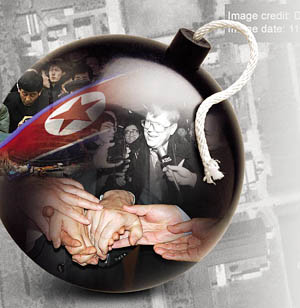 |
His comments came after U.S.-based ABC News said, citing U.S. officials, Washington detected new evidence of the North's possible preparations for an underground test of a nuclear bomb. The broadcaster quoted a senior State Department official as saying a test is a "real possibility." A senior U.S. military official also talked about a "suspicious vehicle movement" in North Korea's northeastern remote mountainous area of Gilju. The activity includes the unloading of large reels of cable outside an underground facility, it added. The South Korean official, however, pointed out that it is premature to conclude North Korea is actually preparing for an imminent nuclear test, saying "cables can be used for mining work." He stressed the difficulties in keeping track of the North's nuclear activity, unlike its missile program. Missile launching pads are easily spotted by satellites, but nuclear test facilities, mostly underground ones, can be set up anywhere in a country with vast mountainous areas. Last year, U.S. newspaper Wall Street Journal said that Washington detected concrete signs of Pyongyang's preparations for a nuclear test, leading to a cascade of follow-up reports by foreign media, but nothing happened. In 1997, Washington also accused Pyongyang of operating an underground nuclear test site in Kumchang-ri, northwest of Yongbyon, known as the North's nuclear center. The U.S. sent a team of inspectors there two years later but found nothing. "Of course, there is a logical possibility that North Korea will test its nuclear weapons any time, as it declared last year it succeeded in developing nuclear weapons," the official said. "A common view is that the North has the technology for conducting a nuclear test." Another South Korean government official said North Korea may take another action to draw international attention just before or after next month's Seoul-Washington summit. He stressed the opinion is based on an assessment of the current situation rather than accurate intelligence. "It seems clear that North Korea has no interest in the six-way talks (on its nuclear arms program) and is in favor of bilateral talks with the United States. The problem is that the North has few cards to play at this moment," the official said, asking not to be named. There is a possibility that the North will fire missiles again before the Sept. 14 summit in Washington between South Korean President Roh Moo-hyun and his U.S. counterpart George W. Bush, or just ahead of the U.S. midterm election in November, he added. After several weeks of media speculation, North Korea test-fired seven missiles, including a long-range missile, into the East Sea between the Korean Peninsula and Japan early last month, an action that triggered an international uproar. The United Nations Security Council adopted a punitive resolution against the North. North Korea immediately responded with a threat to take stronger actions. "We have already clarified that we will have no option but to take stronger physical actions should someone take issue with our army's missile launch training for self-defense and put pressure on it," a statement by North Korea's Foreign Ministry read. Seoul, Aug. 18 (Yonhap News)





